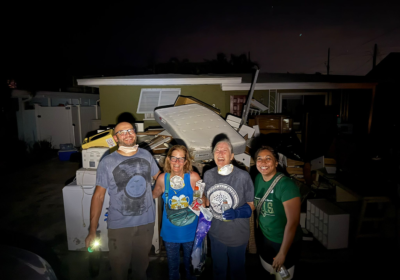Schools share strategies for student success

ORACLE PHOTO / RUSSELL NAY
As universities located in Florida’s three largest metropolitan areas, USF, UCF and FIU are a driving force in the state’s higher education.
Combined, the three universities account for nearly half of all baccalaureate degrees in Florida.
In this year’s Florida Board of Governors (BOG) performance-based funding ranking system, which determines how much money state universities receive based on their performance, USF placed second and UCF and FIU tied for third – totaling more than $65 million between the three.
The three universities came together last year to form the Florida Consortium of Metropolitan Research Universities and outlined the four impacts they hoped their union would accomplish — fueling Florida’s economy, increasing the number of graduates in high-demand job fields, focusing on the success of underrepresented and limited-income students in college and in careers and emphasizing career readiness for all graduates.
In order to accomplish the consortium’s goals, each university is working to implement strategies that focus on closely monitoring students’ progress toward accomplishing their degrees and ensuring students graduate with the skills they need to find employment in their respective fields.
While the specific methods may differ from school to school, each fall under the consortium’s general strategies, and consortium Executive Director Michael Preston said each university will work to share successful practices.
Concerning keeping students on track toward a degree, USF Vice Provost Paul Dosal said USF is currently refining a software tool called Inspire for Advisers which he expects will be in use by the upcoming fall semester.
The software will allow academic advisers to identify students who are at risk of not completing their degrees. Students would be evaluated on their overall performance in their classes, including if they are actively attending classes, if they are completing assignments and even if they are participating in class.
He said once identified, students who are deemed at risk would be asked by an adviser to come in for an advising session where they could discuss the student’s academic performance and attempt to revise the student’s academic plans to meet his or her needs for a degree.
“Our goal here is to facilitate the creation of these paths and help (students) get there as soon as possible,” Dosal said. “We’re not trying to mandate what students do but … pull from a better understanding of what they want to do and what their interests are and then chart a path that helps them get to that destination.”
Russ Coughenour, assistant vice president for Career Services at USF, said as a part of the consortium’s focus on career readiness for students, the university is also working to strengthen its internship programs with community business partners and make internship opportunities more easily accessible for students.
Coughenour said Career Services has proposed to hold a virtual career fair for internships in November, which would allow students from USF, UCF and FIU to log into a website and view internships within the universities’ three metropolitan areas.
“That is probably the best example of where we, alongside UCF and FIU, are working collaboratively to expand both the number and the variety of internships available to students at the three universities,” he said. “A student can, from the privacy of their apartment or residence hall … search for internships, interact with recruiters via chat room and even be invited into a private chatroom where they can be Skype interviewed for the internship.”
Coughenour also said USF’s Career Services started an employer relations function this spring which uses USF’s large employer database to reach out to employers without internship programs and help them start one.
“I would say 35 to 40 percent of companies in that database don’t even have an internship program right now,” he said. “A lot of companies want to (start an internship) — they just don’t know how to get it done.”
At FIU, Dean of Undergraduate Education Douglas Robertson said while its academic advising enhancement plan has been in the making for four years, the university is continuing to develop it under the consortium.
He said FIU currently has an office that does nothing but attempt to identify academic barriers for students, both overall and in individual cases.
“We would like to, with our partners, create a data warehouse that can handle big datasets,” Robertson said. “We can share these practices, but we can also do similar analyses across the three institutions.”
To help students become career ready earlier in college, he said FIU is also planning to integrate a career development program with its academic advising program, as well as notify students about internships they could apply for.
Robertson said FIU is also using a $500,000 Helmsley Charitable Trust grant to research lower division STEM gateway courses for the consortium, as these courses are one of the biggest barriers to academic progress.
In Orlando, Preston said UCF, like USF, will enhance its academic advising efforts by quickly responding to when students appear to fall off track.
He said advisers will receive alerts to when students make academic decisions which could jeopardize their degrees, like unexpectedly making low grades or choosing courses which are inherently difficult to take together.
Preston also said UCF will focus on helping students finish their bachelor’s degrees in four years instead of paying additional expenses and spending unnecessary time out of the workforce.
By 2018, the consortium specifically hopes to increase the number of bachelor’s degrees in the state by 12 percent or 3,660 degrees, increase the six-year first-time-in-college graduation rate for minority students by four percentage points to a total of 67 percent, increase the number of graduates employed or continuing education in Florida by three percentage points to a total of 79 percent and increase graduates’ salaries by 10 percent for an average of $39,072.
To date, the consortium has received $8.5 million in funding from the BOG, $500,000 for five years from the Helios Education Foundation and an annual $75,000 from each university in the partnership. While the consortium’s latest funding request for $12 million did not make the finalized state budget, Dosal said the consortium will continue its attempt to receive additional funding from philanthropic community members like the Helios Education Foundation and work toward its 2018 goal completion date.






